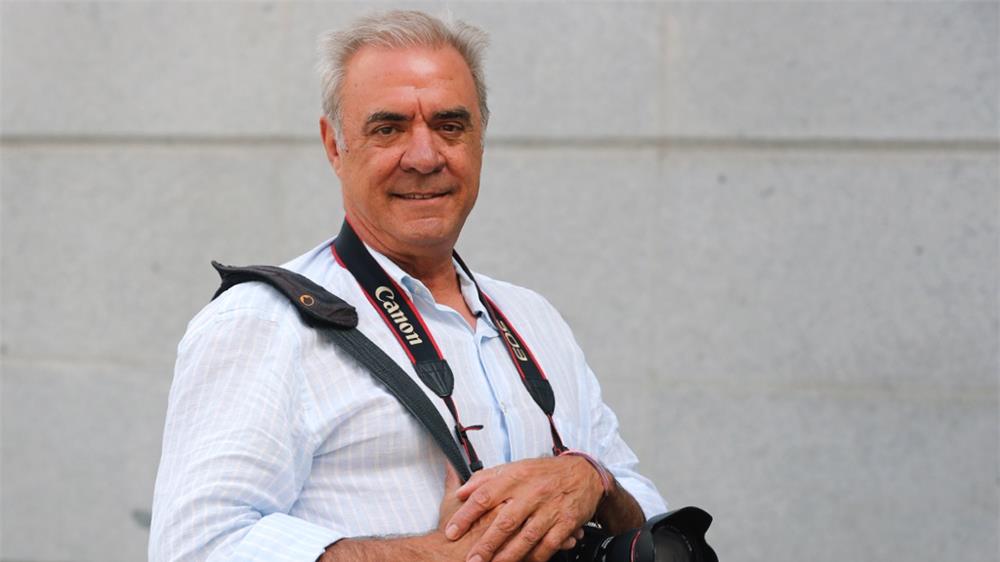متيقنا من كلماته، هكذا بدا وهو يخبرني مبدأه"حين يصافحني سياسي، أعلم أني فعلت شيئا ما لم يكن عليّ فعله فيؤنبني ضميري، وحين يسمح لي الشرطي بالقيام بمهمتي التوثيقية أدرك أني هرِمتُ جسدا لا قلبا".
لم يكن يظن أثناء دراسته العلمية أن عليه أن يهجر الطب والعدسة الطبية لصالح عدسة الكاميرا. أربعون سنة مضت على تركه دراسته العلمية والتحاقه بصحيفة إلباييس الإسبانية التي تعتبر من أهم الصحف العالمية والتي تتعاون معها ويكيليكس. سافر إلى أكثر من مئة دولة ليغطي أحداثا عالمية.
بالنسبة له فإن من الصعب على من يعمل لإيصال المعلومة أن يجد الراحة في أي مكان، لأن رواية العاملين في حقل الصحافة عادة ما تخالف الرأي الرسمي، وبالتالي لا يوجد بلد يتمتع فيه الصحفيون بأريحية العمل بشكل تام.
إنه برناردو بيرس توبار أقدم مصور صحفي في صحيفة إلباييس الإسبانية. في هذا الحوار الخاص لمجلة "الصحافة" يحكي لنا جزءا من تجربته ومشاهداته، ونتعرف من خلال حديثه على وضع الإعلام في إسبانيا.
أول الحكاية..
"كنت أدرس الطب في الجامعة، كانت تشدني الصور العلمية فكنت أحاول أن أبحث عنها قدر الإمكان.. فجأة وجدت نفسي ممارسا لها.. ربما المحيط الذي كنت أتواجد فيه ساعد على ذلك، فوالدي وأجدادي اشتغلوا في عالم المعلومة. أنا أعتبرهم من مدرسة غوتنبرغ غلاكسيا (1).
صادف تفرغي للتصوير بوادر تأسيس صحيفة إلباييس، فكنت من أوائل الملتحقين بها.. هذه السنة نحتفل بمرور أربعين سنة على تأسيسها".
تأسيس إلباييس وبداية التحول الديمقراطي
"قبل أربعين سنة من الآن، كنا نعيش حكما دكتاتوريا في إسبانيا.. كان الوضع متأزما، فبعد خروجنا من الحرب الأهلية كنا على موعد مع حكم دكتاتوري بقيادة فرانكو (2). كانت الساحة السياسية منقسمة إلى جهتين: جهة موالية لحكم الدكتاتور، وجهة لا تستطيع الإفصاح عن أفكارها. حرية التعبير كانت أكثر ما نفتقده في تلك المرحلة.. في ذلك الوضع السياسي، لم تكن هناك وسائل إعلامية مستقلة، بل كان معظمها يقوم بالبروغاندا وتغطية مصالح الحاكم.. توفي فرانكو في يناير/كانون الأول 1975، وفي فبراير/شباط 1976 تأسست صحيفة إلباييس. يمكننا أن نقول إنها ردة فعل آنية لمجتمع وحاجته إلى التعبير وإلى إعلام غير حكومي..
هنا نستنتج تعطش المواطنين إلى وسائل إعلام مستقلة، ومن هنا كانت البداية التي ساعدت على تحقيق التحول الديمقراطي في إسبانيا.. لا نزال -بعد أربعين سنة- نتذكر نفس الحافز والمبدأ: التحقق من صحة الخبر، التوثيق الجيد، ثم تقديم المعلومات للقارئ.
تعتبر صحيفة إلباييس اليوم الأكثر انتشارا في البلاد، وتعد مرجعا إعلاميا ليس في إسبانيا وحسب، بل في أميركا اللاتينية، وهي واحدة من الصحف الخمس في العالم التي تتعاون مع ويكيليكس.. في إسبانيا أن تُصنف الرقم الأول في المشهد الإعلامي لا يمنع عنك اضطهاد وسلب الحق في المعلومة، وأقصد هنا المعلومة المصورة والمعلومة المكتوبة".
المصور الصحفي
حين سألتُه عن تعريف المصور الصحفي، ظل متمسكا بأن لا فرق بين الصحفي والمصور الصحفي، لأن مهمتهما واحدة. فتوبار يعتبر أن المصور الصحفي شخص يأخذ طريقا مخالفا للكلمة ويحاول أن يعكس المشاكل الاجتماعية والسياسية والاقتصادية وأيضا السعادة والجمال وشساعة العالم، ليس عبر نبل الكلمات، وإنما عبر وفاء الصورة. فهل تغيّر مفهوم التصوير الصحفي؟
مبدأ واحد.. إيصال المعلومة
إن المبدأ واحد والهدف غير متغيّر.. إذا أردنا الحديث عن تطور علم الصورة، سنتحدث بداية عن الجانب التقني، فتوبار يرى أن استعمال الكاميرا قد تغيّر كثيرا.. "دعيني أشير إلى أن ظهور العالم الرقمي وتطوره كان مرتبطا بالصور، فأول عنصر ولد من رحم العالم الرقمي كان صورة.. نحن كمنتجي الصور -سواء الفيلمية أو الفوتغرافية- يجب أن نتماهى مع التطور التقني، لكن مع الحفاظ على الرسالة.. بالإضافة إلى تقديم الصورة الحل، لأن الواقع الذي نعيشه يفرض علينا الانخراط في تقديم حلول لا في افتعال أزمات.. سنة 1991 كنت أرتب للسفر إلى أميركا اللاتينية لتغطية أحداث مرور 500 سنة على اكتشاف تلك القارة، لأنه كان يعني لنا الكثير كإسبان.. وثَّقت للحدث بكوداك.. كوداك تلك الرائعة (يقولها والحسرة قد علت محياه) رافقتني من تشيلي إلى الحدود مع أميركا الشمالية.. بعدها بسنتين فقط، كان فرضا علينا الانخراط في التحول الجديد نحو الديجيتال".
موهبة أم مسار أكاديمي؟
"مفتاح العمل حسب خبرتي ليس الدراسة، وإنما الموهبة العاقلة.. نعم، موهبة المرسل في إيصال الرسالة. توفر عناصر أساسية أمر واجب، أهمها: الإبداع والجرأة.. في الكثير من الأحيان من يقوم بهذا العمل ويبدع هم من لديهم جرأة العمل، يولدون ليكونوا صحفيين لا أكثر، يقتنصون اللحظات.. التكوين الأكاديمي هو واجب وإرادة من أجل تلقيح الموهبة بالمعرفة.. الخلاصة؛ لكي تكون صحفيا، عليك أن تكون صاحب القرار والقدرة على رواية ما تحس وما ترى، وترافق الحقيقة فقط".
الإعلام الإسباني وتحدي التحول الرقمي
"الإعلام في إسبانيا كالإعلام العالمي، فهو ضحية أزمتين: الأزمة الاقتصادية العالمية وأزمة تغييرات نموذج التواصل. أولا بسبب قلة الموارد المالية، أما ثانيا فبسبب تعدد المنصات وظهور أشكال جديدة في إرسال المعلومة، مما يفرض على المؤسسات خطوات جريئة لمسايرة المنصات المتجددة، الأمر الذي يتطلب كوادر جديدة أو تكوينات خاصة لطاقم المؤسسة".
العالم الرقمي جعلنا نخطئ ونعتذر
"في السابق كان هناك وقت للتفكير في العنوان والصورة المصاحبة للخبر.. الآن وسائل الإعلام فقدت القدرة على التركيز في موضوع الحدث وكيف ستقدمه، فقدت القدرة أيضا على التفاعل مع الأحداث الحزينة والسعيدة التي تحتاج اختيار الكلمات..
أصبحنا نخطئ في اختيار الصورة المناسبة ثم نعتذر، وأصبحنا نتلقى توجيهات حول الصورة المختارة والكلمات وحتى الألوان المستعملة.. فقدنا القدرة على التمعن مقابل ربحنا لتفاعل المتلقي وقدرته على التحليل وتوجيه الإعلام، مما قلل من حدة مسؤولية الجسم الصحفي".
الكلمة الأخيرة
"زرت أكثر من مئة دولة، وعانيت من المحاصرة أثناء محاولتي القيام بمهمتي، لكني لا أملك إلا أن أختار نفس التجربة إن عشت حياة ثانية.. كلمتي لكل الصحفيين الشباب: استمتعوا بكل لحظة في عالم الصحافة لأنها تجعلكم تعيشون أكثر من حياة. كما أقول لهم بأن الصعوبات لا توجد إلا أمام أبواب منازلهم، لأنك في المكان الذي تظنه يعرف الحرية قد تُحاصَر، وفي المكان الذي لا تسمع فيه مصطلح الحرية قد تتوفر لك السبل لتعمل بأريحية".

هوامش
(1) غوتنبرغ غلاكسيا: نظرية فلسفية لصاحبها الفيلسوف مارشال مولكهان. تتأسس النظرية على إظهار الطريقة التي من خلالها تبرز أشكال التجارب ووجهة النظر العقلية والتعبيرية عبر وسيلة اللفظ بداية والطباعة فيما بعد.
(2) فرانسيسكو فرانكو: (1892-1975)، قائد عسكري تولى رئاسة إسبانيا من أكتوبر/تشرين الأول 1936 وحتى وفاته عام 1975. وصل إلى السلطة بعد الحرب الأهلية الإسبانية (1936-1939).








































